Index relies entirely on the support of donors and readers to do its work.
Help us keep amplifying censored voices today.
Governments don’t really like coming across as authoritarian. They may do very authoritarian things, like lock up journalists and activists and human rights lawyers and pro democracy campaigners, but they’d rather these people didn’t talk about it. They like to present themselves as nice and human rights-respecting; like free speech and rule of law is something their countries have plenty of. That’s why they’re so keen to stress that when they do lock up journalists and activists and human rights lawyers and pro-democracy campaigners, it’s not because they’re journalists and activists and human rights lawyers and pro-democracy campaigners. No, no: they’re criminals you see, who, by some strange coincidence, all just happen to be journalists and activists and human rights lawyers and pro-democracy campaigners. Just look at the definitely-not-free-speech-related charges they face.

Khadija Ismayilova is one of the government critics jailed ahead of the European Games.
Azerbaijani investigative journalist Khadija Ismayilova was arrested in December for inciting suicide in a former colleague — who has since told media he was pressured by authorities into making the accusation. She is now awaiting trial for “tax evasion” and “abuse of power” among other things. These new charges have, incidentally, also been slapped on a number of other Azerbaijani human rights activists in recent months.
Belorussian journalist Irina Khalip was in 2011 given a two-year suspended sentence for participating in “mass disturbance” in the aftermath of disputed presidential elections that saw Alexander Lukashenko win a fourth term in office.
Chinese dissident Zhu Yufu in 2012 faced charges of “inciting subversion of state power” over his poem “It’s time” which urged people to defend their freedoms.
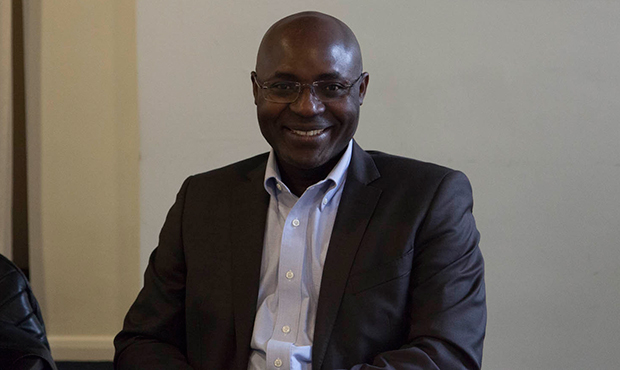
Journalist and human rights activist Rafael Marques de Morais (Photo: Sean Gallagher/Index on Censorship)
Rafael Marques de Morais, an Angolan investigative journalist and campaigner, has for months been locked in a legal battle with a group of generals who he holds the generals morally responsible for human rights abuses he uncovered within the country’s diamond trade. For this they filed a series of libel suits against him. In May, it looked like the parties had come to an agreement whereby the charges would be dismissed, only for the case against Marques to unexpectedly continue — with charges including “malicious prosecution”.
Kuwaiti blogger Lawrence al-Rashidi was in 2012 sentenced to ten years in prison and fined for “insulting the prince and his powers” in poems posted to YouTube. The year before he had been accused of “spreading false news and rumours about the situation in the country” and “calling on tribes to confront the ruling regime, and bring down its transgressions”.

Nabeel Rajab during a protest in London in September (Photo: Milana Knezevic)
In January nine people in Bahrain were arrested for “misusing social media”, a charge punishable by a fine or up to two years in prison. This comes in addition to the imprisonment of Nabeel Rajab, one of country’s leading human rights defenders, in connection to a tweet.
In late 2014, Saudi women’s rights activist Souad Al-Shammari was arrested during an interrogation over some of her tweets, on charges including “calling upon society to disobey by describing society as masculine” and “using sarcasm while mentioning religious texts and religious scholars”.
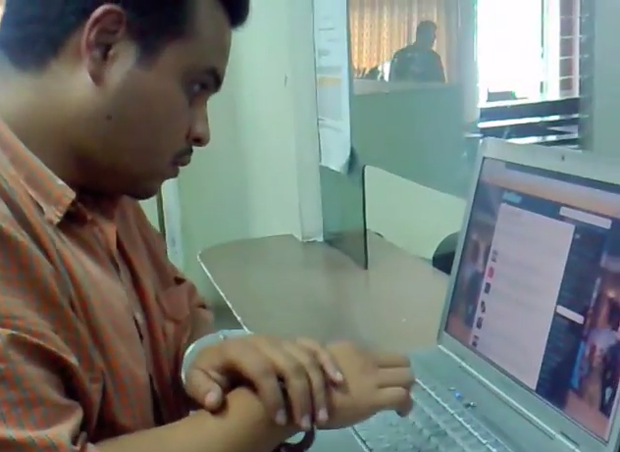
(Image: Oscar Mota/YouTube)
Jean Anleau was arrested in 2009 for causing “financial panic” by tweeting that Guatemalans should fight corruption by withdrawing their money from banks.
Swazi Human rights lawyer Thulani Maseko and journalist and editor Bheki Makhubu in 2014 faced charges of “scandalising the judiciary”. This was based on two articles by Maseko and Makhubu criticising corruption and the lack of impartiality in the country’s judicial system.
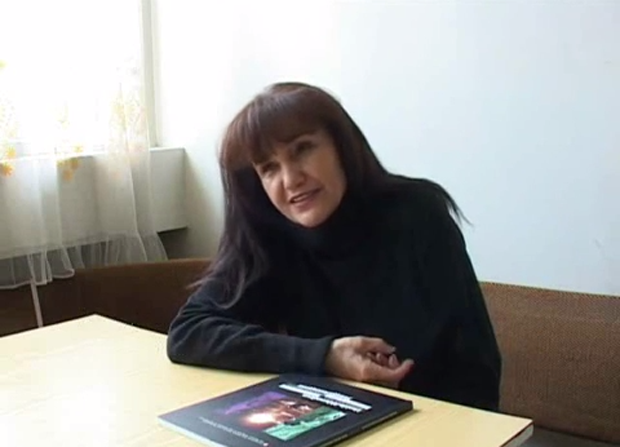
Umida Akhmedova (Image: Uznewsnet/YouTube)
Uzbek photographer Umida Akhmedova, whose work has been published in The New York Times and Wall Street Journal, was in 2009 charged with “damaging the country’s image” over photographs depicting life in rural Uzbekistan.
Al-Haj Ali Warrag, a leading Sudanese journalist and opposition party member, was in 2010 charged with “waging war against the state”. This came after an opinion piece where he advocated an election boycott.
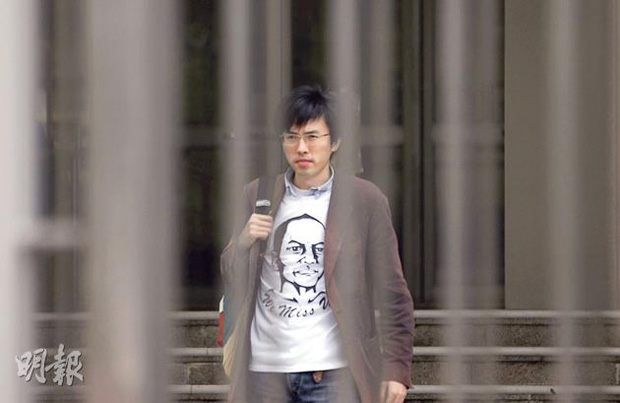
Avery Ng wearing the t-shirt he threw at Hu Jintao. Image from his Facebook page.
Avery Ng, an activist from Hong Kong, was in 2012 charged “with nuisance crimes committed in a public place” after throwing a t-shirt featuring a drawing of the late Chinese dissident Li Wangyang at former Chinese president Hu Jintao during an official visit.
Rachid Nini, a Moroccan newspaper editor, was in 2011 sentenced to a year in prison and a fine for compromising “the security and integrity of the nation and citizens”. A number of his editorials had attempted to expose corruption in the Moroccan government.
This article was originally posted on 17 June 2015 at indexoncensorship.org
![By Thatcher Hullerman Cook (https://www.flickr.com/photos/poptech/5107260975) [CC BY-SA 2.0 (http://creativecommons.org/licenses/by-sa/2.0)], via Wikimedia Commons](http://www.indexoncensorship.org/wp-content/uploads/2015/02/John_Legend_NEW-SIZE.jpg)
By Thatcher Hullerman Cook (https://www.flickr.com/photos/poptech/5107260975) [CC BY-SA 2.0 (http://creativecommons.org/licenses/by-sa/2.0)], via Wikimedia Commons
“While sitting at his gleaming grand piano, accompanied by the subtle brilliance of four string instrumentalists and a guitarist, the 35-year-old crooner captivates his audience at the simply wonderfull (sic) intimate venue,” reads the promotional blurb on the festival’s website. And it looks to have been a popular booking, as tickets reportedly sold out in hours.
But many are unhappy with the concert going ahead, due to Bahrain’s poor human rights record. The Gulf monarchy has seen significant protests since 2011 calling for democracy and human rights, which have been cracked down on by authorities. “The government continued to stifle and punish dissent and to curtail freedoms of expression, association and assembly,” Amnesty International said of Bahrain in their recently released annual report.
Among those speaking out against the show, was prominent human rights defender Maryam Alkhawaja. Her father and sister are currently imprisoned in Bahrain on charges related to their campaigning work.
.@johnlegend ur performance in #Bahrain will b used 2 whitewash regime violations which include: systematic #torture, extrajudicial killings
— Maryam Alkhawaja (@MARYAMALKHAWAJA) February 26, 2015
.@johnlegend 10 mins frm where ull b prforming, protests will b attackd, ppl teargassd. Dont allow ur music 2 drown out their cries #Bahrain — Maryam Alkhawaja (@MARYAMALKHAWAJA) February 26, 2015
.@johnlegend song #Glory is an inspiration to everyone fighting for rights. Your integrity is at stake if you perform it in #Bahrain — BIRD (@BirdBahrain_) February 26, 2015
People should pressure signer @johnlegend who claim to love civil rights so he would cancel his trip to support AlKahlifa Moanrchy #Bahrain — Ali AlAhmed (@AliAlAhmed_en) February 26, 2015
Nabeel Rajab, another famous human rights campaigner, also reached out to Legend on Twitter. Rajab was in January sentenced over a tweet where he allegedly “denigrated government institutions”. He was today again summoned by Bahraini police, and fears he can be arrested “at any time“.
.@johnlegend – In #bahrain thousands are incarcerated for peaceful protest and many of them are #Children #glory pic.twitter.com/DO1JzMWhRi
— Nabeel Rajab (@NABEELRAJAB) February 25, 2015
Many expressed disappointment that Legend, who on numerous occasions in recent times has spoken out on racism and injustice in his native US, would perform in Bahrain given the country’s current political situation.
As someone speaking out against incarceration in the US, shocking that @johnlegend is going to sing in Bahrain with 3000 political prisoners — Ala’a Shehabi (@alaashehabi) February 25, 2015
.@johnlegend Please don’t perform in Bahrain, John. After your Selma track, you cannot support a repressive segregationist regime like that. — AHMED HUSSAIN ☪ (@iA7med80_) February 26, 2015
Bahrainis have made their own version of @johnlegend‘s Glory, about their struggle for freedom and human rights https://t.co/hVB4ug2PsP
— Daniel Wickham (@DanielWickham93) February 25, 2015
It would be a fantastic statement of solidarity against oppression for @johnlegend to refuse to perform in #Bahrain. Please consider it. — Daniel Wickham (@DanielWickham93) February 25, 2015
.@johnlegend how can one of today’s most politically thoughtful artists play Bahrain with 1000s of political prisoners? Via @alaashehabi — Marc Lynch (@abuaardvark) February 25, 2015
Marc Lynch also expanded on his thoughts in an open letter to Legend:
You have emerged as a voice of conscience in today’s America. In your writing, performances and speeches you have proven yourself to be a principled champion of equality who is unafraid to speak out for what is right. Last year, you wrote that “As I watched the final version of Selma, I did so with the backdrop of the streets of many of our major cities filled with protesters, crying out for justice after yet another unarmed black person’s life was taken by the police with impunity.”Bahraini lives have been taken by the police with impunity as well, and Bahraini lives do matter. I hope that you will think deeply about the implications of performing in a country like today’s Bahrain, where the violence of an unaccountable police against peaceful protestors mirrors everything against which you have spoken out at home.
While some called for a cancellation of the show, others urged Legend to use his platform to speak out about human right abuses in Bahrain, as he has done in the US.
I call all #HumanRights activists to let #artist @johnlegend know all crimes of #Bahrain regime before he go @JohnHorneUK @BHWatch #uk #USA — Hassan Qamber (@hqamber73) February 23, 2015
If @johnlegend decides 2 go thru with #Bahrain shows, he must bring the msg of “Glory” to a country with extreme human rights violations. — Kelsey Waxman (@kkwaxman) February 25, 2015
But not everybody agreed with the criticism.
The stupidity of some people is unreal. Asking John Legend not to come to Bahrain due to protests (that aren’t even important anymore) is… — Moh’d (@MohamedK62) February 26, 2015
…is just stupid. John Legend coming to Bahrain would give our economy a boost (no matter how small or big it is). — Moh’d (@MohamedK62) February 26, 2015
This isn’t the first controversial celebrity visit to Bahrain. In 2012, reality star Kim Kardashian visited the country to launch a Millions of Milkshakes store. As Index’s Sara Yasin wrote at the time: “Bahrain is no stranger to using flashy events to attempt to whitewash its tarnished international reputation.”
Update 2 March 2015, 16:28pm
John Legend has responded to the criticism, saying that “the solution to every human rights concern is not always to boycott” and that he hopes “to meet the many people who are peacefully struggling for freedom, justice and accountability, regardless of what country they live in”. Full statement below, via The Independent:
Some have recently suggested that, due to documented human rights abuses by the government of Bahrain, I should cancel my upcoming concert there. After consulting with human rights experts, I decided to keep my commitment to perform for the people of Bahrain, many of whom I am proud to call my fans, during their annual festival. I have spent quite a bit of time thinking about human rights, civil rights and other issues of justice, both in the United States and abroad. The solution to every human rights concern is not always to boycott. Most of the time I will choose to engage with the people of the country rather than ignore or abandon my commitments to perform for them. Often, the best way to drive progress is to show up and participate in the conversation. As we move this work forward, I hope to meet the many people who are peacefully struggling for freedom, justice and accountability, regardless of what country they live in, and tell them directly that I stand with them. Part of my mission in life is to spread love and joy to people all over the world. I intend to do just that in Bahrain, regardless of my disagreements with some of their governments’ policies and actions.
Additional reporting by Danielle Quijada.
This article was posted on 26 February 2015 at indexoncensorship.org
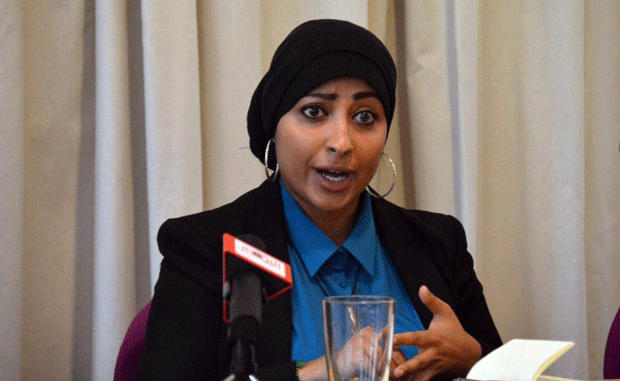
Maryam Al-Khawaja spoke out in October for the release of fellow human rights activist Nabeel Rajab. (Photo: David Coscia for Index on Censorship)
Nine people have been arrested in Bahrain for “misusing social media”, a charge which is punishable by a fine or up to two years in prison.
Human rights defender Nabeel Rajab was last week sentenced to six months in prison over a tweet he posted which was deemed insulting to public institutions. Rajab has been bailed, and tweeted on 21 January that he will appeal his conviction on 11 February.
Human Rights Watch has dedicated seven pages of its 25th annual report to Bahrain. The World Report 2015, released on Thursday, reviews the human rights situation in over 90 countries.
The report states that over 200 defendants have been sentenced to long stints in prison by the Bahraini courts on charges of national security or terrorism, with at least 70 of those being sentenced to life.
It says: “Bahrain’s courts convicted and imprisoned peaceful dissenters and failed to hold officials accountable for torture and other serious rights violations. The high rate of successful prosecutions on vague terrorism charges, imposition of long prison sentences, and failure to address the security forces’ use of lethal and apparently disproportionate force all reflected the weakness of the justice system and its lack of independence.”
In December, co-director of the Gulf Center for Human Rights (GCHR), Maryam Al-Khawaja, boycotted a court hearing which saw her sentenced to one year in prison. Al-Khawaja was charged with assaulting two policewomen last year when she traveled to Bahrain to visit her father Abdulhadi, who is currently serving a life sentence for his involvement in anti-government protests in 2011. In related news, the GCHR website was yesterday reportedly blocked in the United Arab Emirates.
Al-Khawaja’s sister Zainab was arrested in October on charges of insulting the king, and gave birth to her second child just a few days before being sentenced to three years in prison. She was then sentenced to an additional 16 months less than a week later, on separate charges of insulting a public official.
This article was published on 30 January 2015 at indexoncensorship.org
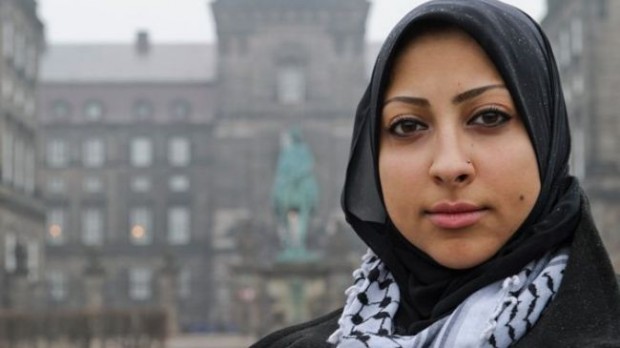
As a human rights defender, I, Maryam Al-Khawaja, Director of Advocacy at the Gulf Center for Human Rights, have decided to boycott my court hearing on the 1 December 2014. During this hearing I am due to be sentenced on trumped up charges of assaulting two policewomen at the Bahrain International Airport. (Update: Al-Khawaja was sentenced to one year imprisonment on 1 December)
The decision to boycott the court was reached based on several grounds:
It has become evidently clear that it is not possible to have a fair and independent trial in Bahraini courts as they stand. The judicial system in Bahrain is highly flawed, and is overrun with egregious human rights violations which usually start during the arrest, and continue throughout what is supposed to be a legal process. I was personally subjected to numerous human rights violations since the moment of arriving in Bahrain and until I was able to leave the country as can be read in my testimony here.
There are medical reports about the injuries I sustained during the assault I was subjected to, for which I continue to need physiotherapy. My case was sped up, and quickly turned for sentencing with complete disregard to legal procedures.
The presiding judge, Mohammed Ali Alkhalifa, in the case brought against me is a member of the ruling family, and has been himself, as well as members of his family, identified previously during my advocacy campaigns as implicated in human rights violations. This makes his presiding over the case a clear case of conflict of interest given the personal grievances he may have against me. This judge in particular, it is important to note, has been involved in the sentencing of numerous human rights defenders including Nabeel Rajab and Naji Fateel in unfair trials.
During my imprisonment I met with the SIU, headed by Nawaf Hamza, to submit a complaint against the three policewomen and the first lieutenant who assaulted me at the airport. The prosecutor, Mohammed Al-Hazaa, rewrote my statement in his own words, attempting to implicate me in violations, and refused to correct what he had misquoted. This resulted in my refusal to sign the papers and filing of a complaint against the prosecutor. One day before the sentencing, namely on the 30th of November 2014, and due to almost daily follow up by my lawyer, the public prosecution notified him that the complaint case had been revoked. Despite my complaint about the assault since the beginning of my arrest, it was only one day before the sentencing that my lawyer was finally able to get a statement from the public prosecution that my complaint case had been revoked, at a time when the trumped up assault charges against myself were speedily processed and turned for sentencing.
During the interrogation I was subjected to, I was refused access to my lawyer by the prosecutor dealing with my case. During my imprisonment my lawyer was not given any visits, nor was the Danish embassy. The way that the public prosecution deals with politically motivated cases is it uses all aspects of the government to provide impunity for the perpetrators of violations.
Based on the reasons stated above, I find any and all cooperation with the court or attendance of the hearings by myself as a problematic legitimisation of an unfair and biased court. Therefore I have decided to boycott the hearings, and have asked my lawyer to do the same.
It is important to note here, if I, as a human rights defender, whose case receives international media and diplomatic attention is handled in this way; it is gravely concerning how cases not receiving attention are handled by the authorities in Bahrain.
Maryam Al-Khawaja
Director of Advocacy
Gulf Center for Human Rights
30th November 2014